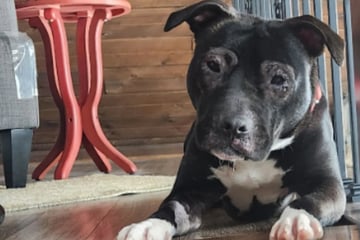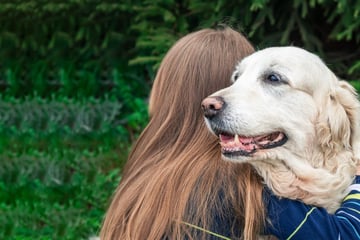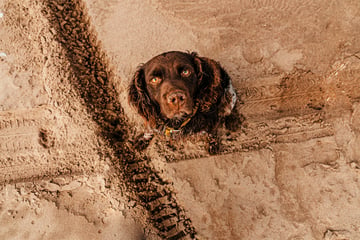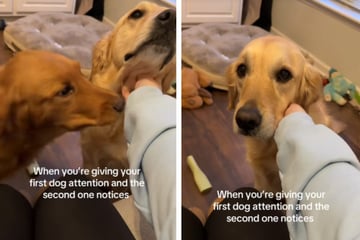Why is my dog restless and pacing?
If your dog is restless and constantly pacing up and down, something could be seriously wrong. While it may seem innocuous, it is important to get to the bottom of this behavior and find out why your dog is restless.

Dogs should sleep for at least 16 hours every day and, if they don't, are at risk of getting very sick.
It's important to recognize the symptoms of dog restlessness, so that it can be diagnosed and acted upon as soon as possible.
Let's be real: there could be nothing wrong, but constant pacing and restlessness can be a truly troubling sign in our canine companions.
In this dog guide, TAG24 will take a look at why dogs get restless and start pacing.
If you're wondering "Why is my dog restless and pacing?" read on for all the basics.
Important: Using the available information, we have put together a list of possible reasons why your dog might be restless, but if this symptom is seen in your dog, it is important to go to a veterinarian.
My dog is acting weird and restless
It's always important to watch your dog's body language and take notice of their routines, habits, and usual behaviors. When things change, it is always best to check up on them. Take a look at their paws and in their fur, and if you are concerned something is wrong, take your dog to the vet.
Restlessness is one of these critically important signs of illness, as is constant pacing – often paired with noises such as wheezing, coughing, and groaning. If your beloved doggo has gone from a relaxed canine companion to one that is constantly alert or stumbling around seemingly disoriented, things could be seriously off and action needs to be taken.
Of course, it could be nothing, but your dog should still be checked by the vet. Weird changes in behavior is often a bad sign, and that goes double if your darling doggo is restless or has started pacing up and down. It's best to be careful!
Why is my dog pacing and restless?
There are many potential reasons why a dog might be pacing up and down, or might have become extremely restless. It is completely possible that your dog is okay, so you shouldn't freak out as soon as you notice a change in its behavior, but it's always worth erring on the side of caution.
Here are eight of the many reasons why your dog might be restless or pacing. Keep in mind that this is not a complete list and your first port of call should always be a veterinarian.
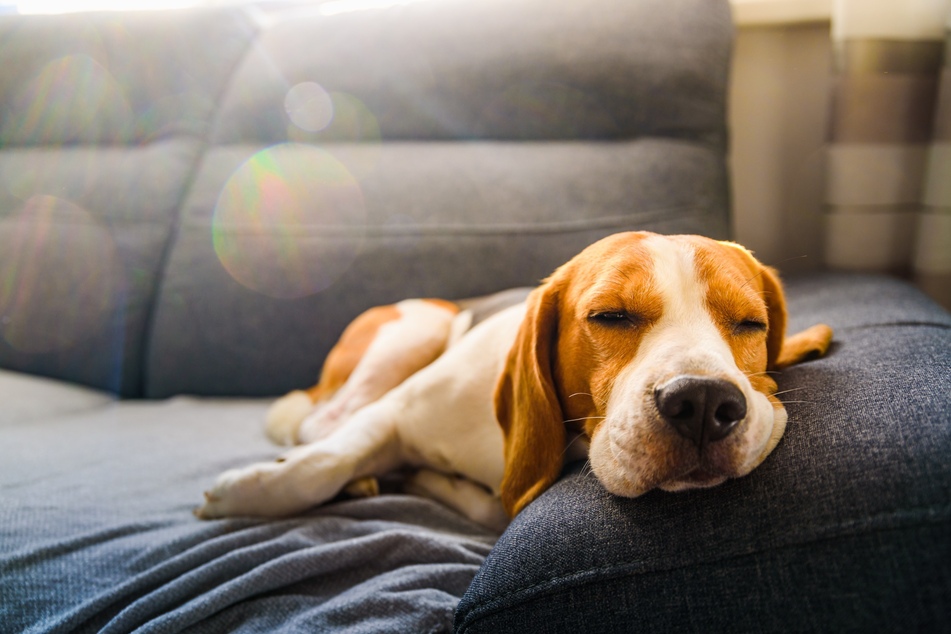
Dog restless when alone
Dogs get extremely restless when they're alone. They are pack animals, and the size of that pack is very important to them. The problem, though, is that you are the only member of your dog's pack, and when you're away, they get worried that you'll never return. If you felt that way, you'd get upset too!
This is due to a thing called separation anxiety, which is basically an inner restlessness caused by the fear of abandonment your dog feels when it is alone. It can be hard to solve, but is a very serious problem that should be acted upon quickly and carefully.
Anxiety and stress causes pacing
If you have a rescue dog, or just a doggo that suffers from anxiety, it is quite likely to become agitated and distressed from time to time. This agitation will manifest itself in restlessness, and will often cause your dog to pace up and down. Some particularly scared dogs can be frightened by even small noises or movements, making dog anxiety a very real and serious problem.
Anxiety and stress is an important factor in any dog restlessness, and can be caused by a vast variety of things. Some are anxious due to past experiences, while others will get restless over environmental changes or general irritability.
Dementia
Restlessness is also a frequently observed symptom of dementia in older dogs. These conditions, known as Canine Cognitive Dysfunction Syndrome or CCDS, are a form of senile dementia that can upset your dog's sleeping rhythm and cause restlessness as well as frequent pacing.
CDDS changes the way that your dog's brain functions and may cause it to forget its humans and feel increasingly isolated and stressed. In many cases these dogs won't survive much longer.
Loud noises cause restlessness
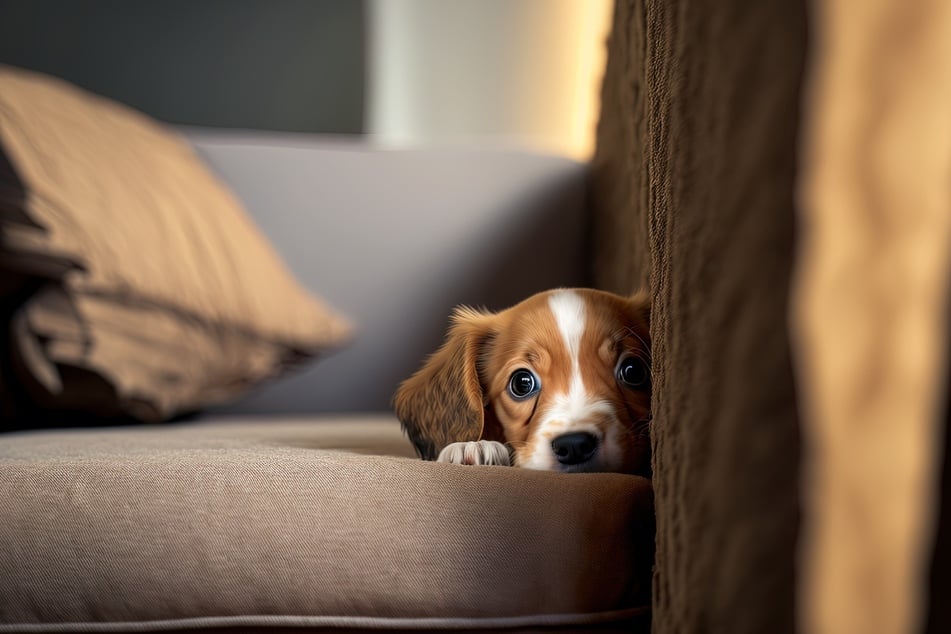
You know how you naturally jump at loud noises? Well dogs do too, except they won't understand what's going on.
Thunderstorms, fireworks, and big parties will often frighten dogs and cause them to run around like a chicken with its head chopped off.
If your dog seems scared and is panting a lot, looking really restless, and pacing up and down, then it could be because of a loud noise that has occurred or is ongoing.
These noises therefore need to be kept to a minimum if you have a doggo, and your perfect pooch should certainly be kept inside on NYE and the fourth of July.
Your dog might be in heat
Dogs go through periods of heat related to their reproductive system (think of it like a "dog period", though it isn't exactly the same). In many cases this can be extremely uncomfortable for dogs and will trigger many changes in their behavior. Stay calm and get the advice of your vet.
When your dog is in heat, it will naturally become more restless, irritable, and naughty. You can expect male dogs to start humping and female dogs to start getting increasingly uncomfortable.
Medication
Has your dog started taking some new medication? Well, medicine can have negative side effects and those same side effects can cause restlessness and discomfort. If your dog suffers from allergies, anxiety, thyroid problems, or something else that requires medical treatment, find out the potential side effects before you begin so that you're ready to deal with them.
Sleep disorders
Dogs can suffer from sleeping disorders too, and they can often trigger nasty symptoms in our canine companions. Indeed, dogs do dream and will have nightmares that can cause restlessness and fear when they wake up. You might also notice that, if this is occurring, they will regularly shuffle around in their sleep.
If your dog is constantly moving while it sleeps, and it keeps waking up disorientated, restless, and upset, then it could be having nightmares or it could even have a sleep disorder of some kind.
Your dog could be pacing due to pain
Dogs are used to having a community of other canines around them, but are also used to leaving weak or sick animals behind. This is due to their supposed weakness and, as a result, dogs suffering from pain will find themselves in both physical and mental discomfort.
This is a very serious problem because it indicates that your dog is in a lot of pain or is feeling very sick. As a result, if your dog is restless or pacing up and down due to pain or illness, you should seek urgent medical treatment.

How to calm a restless dog
While your number one priority should be to take your dog to the vet and get it checked out as soon as humanly possible, there are a few things that you can do in the meantime. None of these options will solve the problem – unless your vet diagnoses them with dog anxiety – but maybe they'll help keep your doggo calm and relatively happy.
Here's how to calm your dog down when it gets restless or starts pacing:
- Make them comfortable: The most important thing is to provide a comfortable and safe place for your doggo. You want it to have plenty of blankets, some soft pillows, and friendly faces close-by. Try sleeping in a different room to your dog, or sleep closer, and just optimize everything as best as possible.
- Perfect their diet: Check your dog's diet and make changes as required (by your vet) to improve its health.
- Play games and use up excess energy: It is possible that your dog is just a bit overexcited, take it on a walk or play some puzzle games to tire it out. You want to avoid boredom and make sure that your dog gets regular exercise.
- Get better training: If your dog hasn't been trained since it was a puppy, it could easily start to exhibit bad behaviors. It's vitally important to train your dog, so get it some agility training, teach it some words, and get those obedience levels up.
- Adjust the temperature: Your dog's sleeping area or home could be too hot or too cold for your pet. Adjust the thermostat and try to optimize it.
Please remember that none of these options should replace a trip to the vet. Once it has been established that nothing too serious is wrong, feel free to try some of these methods.
Dogs that are restless and pacing should go to the vet
We know that we keep saying this, but there's a reason for it: You don't want your dog to get seriously sick. The internet is full of great advice, some cool tips and tricks, and can be a great way for you to contextualize what's going on, but it can never replace proper professional advice.
Get a good vet, develop a strong relationship with them, and make sure to have a consultation whenever something's going wrong with your darling doggo.
Cover photo: 123RF/Panyaoti
